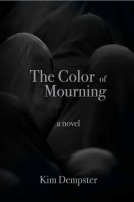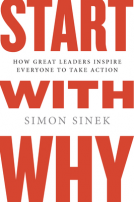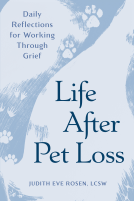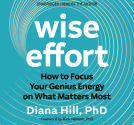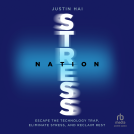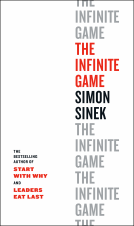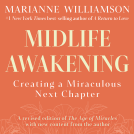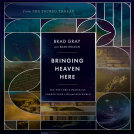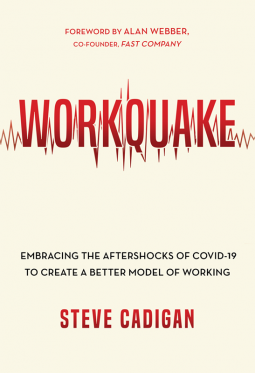
Workquake
Embracing the Aftershocks of COVID-19 to Create a Better Model of Working
by Steve Cadigan
This title was previously available on NetGalley and is now archived.
Send NetGalley books directly to your Kindle or Kindle app
1
To read on a Kindle or Kindle app, please add kindle@netgalley.com as an approved email address to receive files in your Amazon account. Click here for step-by-step instructions.
2
Also find your Kindle email address within your Amazon account, and enter it here.
Pub Date Aug 03 2021 | Archive Date Nov 19 2021
Mascot Books | Amplify Publishing
Talking about this book? Use #Workquake #NetGalley. More hashtag tips!
Description
The future has never been more uncertain for both employers and employees.
They face the same profoundly unsettling dilemma: neither knows what skills they need to develop for the future. Futurists and the media tell us that over 50 percent of jobs today will soon be replaced by automation and AI.
Turnover is higher than it has ever been. The percentage of the workforce that is actively disengaged has never been higher. The shelf lives of certain skills are diminishing rapidly. Longstanding industries and industry leaders are being disrupted. These staggering changes are challenging our concepts of what a career really looks like today and how we should build organizations going forward.
We are facing a Workquake.
It’s time we change the conversation. It’s time to talk about how being human has never been more critical and how we have more agency in applying our talents than at any other time in history. We need to have more real and honest conversations about how to build a better model of the future of work, one in which both employers and employees feel safe and energized.
COVID-19 has presented us the ideal opportunity to tackle this important challenge. Workquake is an attempt to articulate a compelling vision for the future of work through a number of stories, case studies, and author Steve Cadigan’s own experiences.
A Note From the Publisher
Cadigan is renowned for leading LinkedIn’s first talent push and architecting its world-famous culture, now considered the gold-standard. Throughout his twenty-five-year career, he has led teams, cultures, and organizations that have been hailed as “world-class” performers by the Wall Street Journal, Fortune magazine, and more.
Steve graduated from Wesleyan University with a bachelor’s in history and received a master’s degree in HR and organizational development from the University of San Francisco. He lives in California with his family.
Advance Praise
“The shocks to the workplace from COVID-19 are just the latest example of an increasingly dynamic and ever-changing labor marketplace. Workquake shows that the companies best set up to succeed in this environment are those that play the long game by investing and building positive relationships with their employees.” —Christian Sutherland-Wong, CEO, Glassdoor
“Workquake is a must-read for all business and HR leaders.” —Janine Yancey, Founder and CEO, Emtrain
“It’s time to rip up the old playbooks and reconsider what attributes we'll need in order to thrive professionally…Workquake blends considerable personal experiences with relevant research and insightful stories to create highly compelling guidelines for navigating the future of work…[Steve] hits the spot.” —Leela Srinivasan, Board Member, Upwork
“The old contract of work is dead. Workquake will challenge you to pursue learning agility over job security and to paradoxically build a company culture that prepares people to leave.” —Michelle Vitus, Founder and CEO, Slate Advisers
“An empowering book for those seeking to understand how to navigate careers and life in a rapidly changing world.” —Charles Moses, Dean, School of Management, University of San Francisco
“In Workquake, Steve Cadigan lays bare the obsolete social compact that has bound employees to employers since the Industrial Revolution…Cadigan’s writing is clear, direct, and full of stories that make the message memorable.” —John Haggerty, Sr. Lecturer, Cornell University ILR; Former VP Human Resources, General Electric
“An inspirational read about the future of work—at times of great uncertainty and change.” —Tolga Kurtoglu, CEO, Xerox Parc
“In this very refreshing and easy-to-read book, Steve provides compelling examples of how today’s most successful workers and employers embrace constant learning, change, and career flexibility. This is a must-read if you want to thrive in this fast-changing new world order!” —Kirk Herrington, CEO and Board Member, Mploy
“An indispensable read for those serious about the future of work.” —Peter Campbell, Managing Partner, Education Growth Partners
“Steve Cadigan guides us through this changing world with a sense of creativity and optimism that’s inspiring and invigorating, and I recommend Workquake as required reading for all of us.” —Patrick Crane, Board Member, Technology Executive
“Workquake reveals many of [Steve Cadigan’s] game-changing strategies and is a must-read for entrepreneurs and professionals.” —Andrew Mcleod, Founder and C3O, Certn
“Workquake is very timely and should be a must-read for every organization trying to navigate these unprecedented times.” —Bob Bailey, Director, Micron; Former Chairman and Ceo, PMC-Sierra
“Unequivocally, Steve is one of the world’s pre-eminent experts on the future of work. He provides a unique combination of fresh, challenging concepts and practical, tangible solutions born out of his experience as a top-level HR leader. A master storyteller. Workquake is a must-read.” —Adrian Simpson, Co-Founder and Chief Connector, Wavelength
“In the doom and gloom around the future of work, Workquake shines a bright, optimistic light on the opportunity for young people to navigate an ever-changing workplace. A must-read.” —Ashwath Narayanan, Founder and CEO, Social Currant
“This is a bright light provided by one whose expertise is built on firsthand experience and the determination to grow people and companies.” —Matt Barnard, Co-Founder and CEO, Plenty
Available Editions
| EDITION | Hardcover |
| ISBN | 9781645434269 |
| PRICE | $24.95 (USD) |
Average rating from 7 members
Featured Reviews
Interesting Yet Also Seemingly Retreading Well Known Ideas. I'm not exactly known for reading business type books - which is one reason I wanted to read this one, actually, as it sounded interesting even though it was in more of the "Big Idea for Business" type space. While I tend not to discuss my professional life too much in these reviews, it bears a mention in this particular one, so here's a very brief synopsis just to know my own background for my further commentary: I'm a mid career software developer that has mostly worked in local small-medium (500-2000 people) companies that were usually owned by a singular person, though I currently find myself as effectively a team lead working with various offshore teams and onshore contractors for a Fortune 50 company with approximately 200K+ people worldwide. I've had a couple of somewhat innovative breakthroughs, but for the most part I keep my head down and do whatever needs to be done in my current role.
So when I began reading Cadigan's commentary about the future of tech being less about individual skills and more about networking - alluding to what I call the "Flight Director Principle" based off "Iron Flight" Paul Dye's 2020 memoir Shuttle, Houston without ever getting even remotely close to actually naming it, much less naming it as I do here - eh... I can see it, and yet I also see in my own looking/ recruitments (in large part based on the very network Cadigan helped lead at one point) I also see quite a bit of employers - perhaps just in the areas/ jobs I'm looking? - still demanding specific technologies and specific amounts of experience with them. But perhaps Cardigan, presumably with a better sense of the pulse of business generally, has better insight there than I do as more of a grunt on the verge of being a low level leader.
Overall his ideas are certainly intriguing, and absolutely worth considering, one simply wonders, based on the text at hand, whether Cardigan is simply pushing change for change's sake and taking the safe bet that change is always inevitable, or if he truly has specific - unnamed - change strategies. Cardigan here emphasizes adaptability for both the employee and the employer, which while valid, is still a safe and typical recommendation - if you don't know the need to be adaptable, you're probably going to quickly find yourself stuck, on whichever side of the hiring process you find yourself.
And this is my argument that his central theses here are mostly retreads of well known ideas. At least in my own experience in this industry even at the levels I've seen it, most of this stuff is well known, even if the particular anecdotes and case studies he uses aren't always. And yet, this is still absolutely a worthy book to read and consider, because despite the well known general ideas, Cardigan does present a few scenarios and specifics that are interesting to consider and, I can say, many companies *need* to consider. Will the future of employment truly look as Cardigan forecasts here? We don't have enough data at this time to know. But as this is a fairly short book at less than 200 pages of actual narrative, the time investment here is minimal and the rewards could range from minimal to quite substantial - and thus the risk/reward calculation says you really lose more from not reading this book and losing out on some valuable insight than you lose in time if you don't really gain any new insight. Recommended.
 Reviewer 722062
Reviewer 722062
Arguments are very well presented and author has a great perspective on the future of work. A very good book especially for HR leaders and Senior Leadership who want to optimize their company's culture and provides a useful roadmap on how to navigate the new employer/employee relationships. This is what makes the material in this book unique Author also highlights the value of professional networks. I was compelled to reach out to author on LinkedIn to compliment him on his book and the content. Also will recommend to my company's leadership and management.
“The future of work is not about robots, AI and automation. The future of work is about being more human.” That’s Steve Cadigan in the opening of his book “Workquake: Embracing the Aftershocks of COVID-19to Create a Better Model of Working” due out on 3rd August.
Steve is a CEO who speaks ‘our’ language. By that I mean, he understands that employees aren’t going to work in the same company for ever, it shouldn’t be considered ‘disloyal’ to leave and that a learning mindset, both in and out of work is hugely beneficial for a company.
The book breaks neatly into two parts; “Employees” (be more human, learning mindset & managing your career) and “Employers” (new talent strategies, learning velocity & the new org) and he came to his views initially for the book during a job move when through an rather premature connection raid on future LinkedIn colleagues, his activity was shared with existing connections and his current employer. Seeing the outdated expectations in this situation made him ask some pertinent questions.
Signed off in December 2020, he acknowledges that the world of work is changing fast and that he expects the book will need to be updated soon, but in its current form it offers great advice for improving your value as an employer and your values as an employer.
Even thought this book was written pre-pandemic (with an update during the pandemic), Steve Cadigan's ideas are spot-on in terms of how organizations and employees need to understand and adapt rapidly to the new world of work. If anything, these new ways of thinking about work and careers have accelerated given the coming tsunami of employees leaving their current employers if they insist on going back to the way we worked in the past. He argues that the implicit contract between employees and employers is broken and that the only job security is our employability. To stay employable, we need to embrace ambiguity, and to learn skills -- learn how we learn and stay open (not the specific skills we are learning because they will rapidly become obsolete). The book is broken into sections with a part focused on employees and a part focused on organizations.
Cadigan brings great experiences in his HR roles in many different companies as well as citing many articles and resources (there is a great list in the appendix). This book is a quick read and made me what to dive deeper into some of the resources mentioned!
I highly recommend this book. This book is relevant to individuals and organizational leaders.
This is an excellent book about a really interesting work (business?) problem: How this Covid-19 pandemic will affect (if it will do) and, most importantly, how it should affect businesses, human resources practices, organizational models (culture, climate and structure) and a lot more of relevant matters.
Its recommendations are not only valid for people working in important/big companies but they are also relevant for freelance people (an important subject in actual gig economy) and for people looking for a new job (or for a first job!).
Steve Cadigan have a lot of experience that is open to share with all the readers of this book and do it in a easy to comprehend, with lot of insights that frequently makes you stop your reading and reflect about previous personal experiences and how to apply in your own case.
Readers who liked this book also liked:
John Kotter; Holger Rathgeber
Business, Leadership, Finance, Nonfiction (Adult)
Elizabeth Arnott
General Fiction (Adult), Historical Fiction, Mystery & Thrillers
